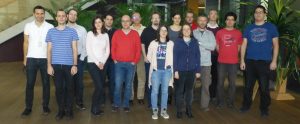 The Mechanism Design research group was founded in 2016 with the support of the Hungarian Academy of Sciences through its Momentum grant. Our research focus is on the algorithmic and game theoretical aspects of matching problems under preferences. This topic belongs to the interdisciplinary areas of Algorithmic Game Theory and Computational Social Choice. We have been involved in the design of real applications, including kindergarten allocations, college admissions, internship allocation and kidney exchange programmes. Currently we are participating in the design of the Hungarian kidney exchange programme, CEMS business project allocation, and we are analysing the data of the Hungarian college admissions, partly sponsored by the Cooperation of Excellences Programme of the Academy. We have been involved in international projects, such as the Matching in Practice Network (2010-), the COST Actions on Computational Social Choice (2012-2016) and on European Network for Collaboration on Kidney Exchange Programmes (2016-2020).
The Mechanism Design research group was founded in 2016 with the support of the Hungarian Academy of Sciences through its Momentum grant. Our research focus is on the algorithmic and game theoretical aspects of matching problems under preferences. This topic belongs to the interdisciplinary areas of Algorithmic Game Theory and Computational Social Choice. We have been involved in the design of real applications, including kindergarten allocations, college admissions, internship allocation and kidney exchange programmes. Currently we are participating in the design of the Hungarian kidney exchange programme, CEMS business project allocation, and we are analysing the data of the Hungarian college admissions, partly sponsored by the Cooperation of Excellences Programme of the Academy. We have been involved in international projects, such as the Matching in Practice Network (2010-), the COST Actions on Computational Social Choice (2012-2016) and on European Network for Collaboration on Kidney Exchange Programmes (2016-2020).
Research focus
Matching problems under preferences have been studied extensively by economists, game theorists, computer scientists and mathematicians since the seminal paper by Gale and Shapley appeared in 1962. The main motivation for the research in this area is coming from the applications, the centralised matching schemes, that have been established since 1952 to allocate residents to hospitals, students to schools or universities, and kidneys to patients, just to mention a few. The scientists in this field not only study the theoretical questions arising in the applications, but often initiate new applications and help to design or redesign existing matching schemes. This work has also been recognised with the 2012 Nobel memorial award in economic sciences given to Roth and Shapley. In our project we will conduct a multidisciplinary research focusing on the game theoretic, algorithmic and mathematical aspects of market design. Besides the theoretical research motivated by the applications, we will continue our involvement in the design of practical applications.